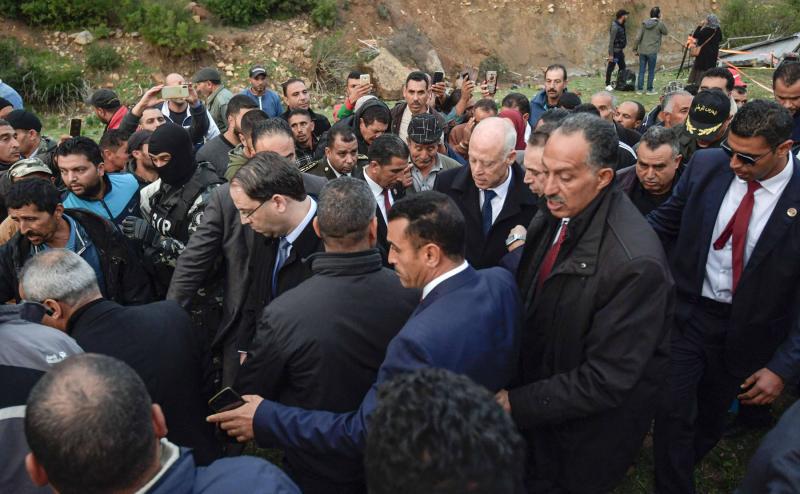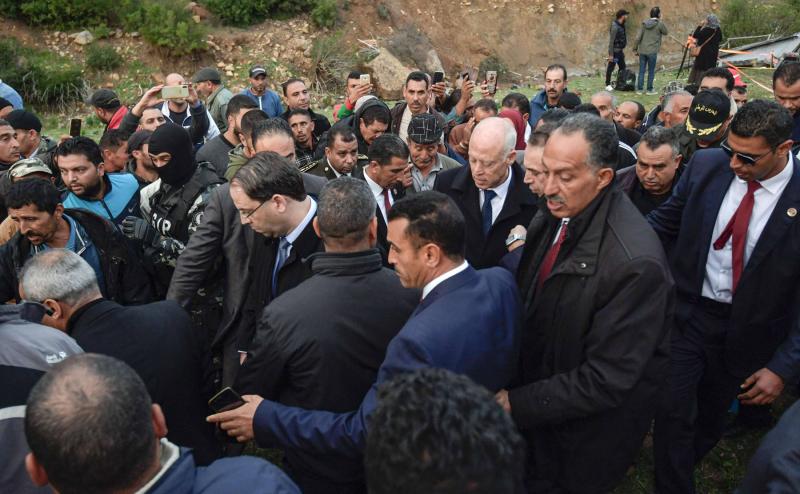Tunisian road tragedy hits a raw nerve
TUNIS - A bus carrying 43 people plunged into a river in the rugged northern area of Amdoun, killing at least 29 people in what was Tunisia’s worst road accident in a decade.
The accident December 1 generated a wave of emotions among Tunisians and underscored the need for “wholesale repair” after years of socio-economic unrest.
Tunisian President Kais Saied voiced Tunisians’ frustration with poor infrastructure and public services.
"Those who left this road in this bad condition shoulder the responsibility for this human tragedy," he said at the site of the accident. "The state of the hospitals does not meet the basic rights of human beings," Saied lamented after touring hospitals in Tunis -- 125km from Amdoun -- where most injured were treated.
"Illegal drugs move easier through the customs administration than medical scanners for hospitals," Saied snapped when Health Ministry officials explained that it often takes seven months for scanners to be cleared by customs authorities.
People in Amdoun complained to Saied about a lack of development and attention from central authorities.
"They snob us, Mr President,” one farmer told Saied. “No senior government official had visited the area for years. They despise us here.”
Saied responded: "No one can disregard you or scorn you.”
Saied, who took office October 23, has reached out to disillusioned Tunisians throughout the country. He was photographed hugging unemployed young people at the presidential palace and encouraged female students in the northern city of Kef struggling in dormitories with no heat in the winter.
The 61-year-old retired law professor, who rose from an independent candidate with no government experience to the country’s highest office, hopes to be a unifying force after a contentious election that resulted in a fractured parliament. However, his rapid rise left many Tunisians asking what role he would play in tackling the country’s many crises.
Saied said there should be an investigation into the bus accident as well as a renewed focus on ensuring Tunisia’s transportation and medical services meet standards.
"The possible causes of the bus accident must be investigated and determined but the infrastructure of the roads, the conditions of circulating vehicles as well the state of hospitals must get particular attention," Saied said.
"It is not normal to transport seriously injured people hundreds of kilometres to get treated in hospitals in the capital while the hospital nearby in Beja lacked a scanner for months."
"In Tunisia, illegal drugs come into the country more quickly than scanners and we claim to be fighting corruption," he repeated.
Local media said an investigation into the bus accident indicated the vehicle was not properly registered and its brakes were not functioning correctly.
"The dramatic accident of the 'bus of death' revealed that almost everything has deteriorated in Tunisia since 2011,” said political writer Samir Gharbi.
"It unveiled serious disruptions and problems with public service, customs, vehicle technical controllers, insurance companies, roads traffic police and many other public services including health, domestic tourism, security and tax authority.”
"Tunisia is at a turning point. Either it plunges into a black hole if it continues on the same path after the emotions end and the tears of the orphans dry or Tunisians rise up together to end this mismanagement and chaos," he added.
Parliament Speaker Rached Ghannouchi summoned deputies from north-western regions to discuss the accident and plan regional development but that move also drew criticism.
"Ghannouchi has been in power for eight years. He has local government officials under his command but has done nothing for these regions,” said leftist MP Mongi Rahoui. “It is Ghannouchi who was behind shelving a draft law over positive discrimination for these regions.
"Ghannouchi and his backers opposed development programmes for these regions and they are now attempting to skirt their responsibilities."
Ennahda Movement deputy Sahbi Attig replied: "You are asking for accounts from government in power for eight years while these regions like Amdoun, Beja, Kef and the south had been marginalised from development for 60 years. Shame on you."
Lamine Ghanmi is a veteran Reuters journalist. He has covered North Africa for decades and is based in Tunis.
This article was originally published in The Arab Weekly.




